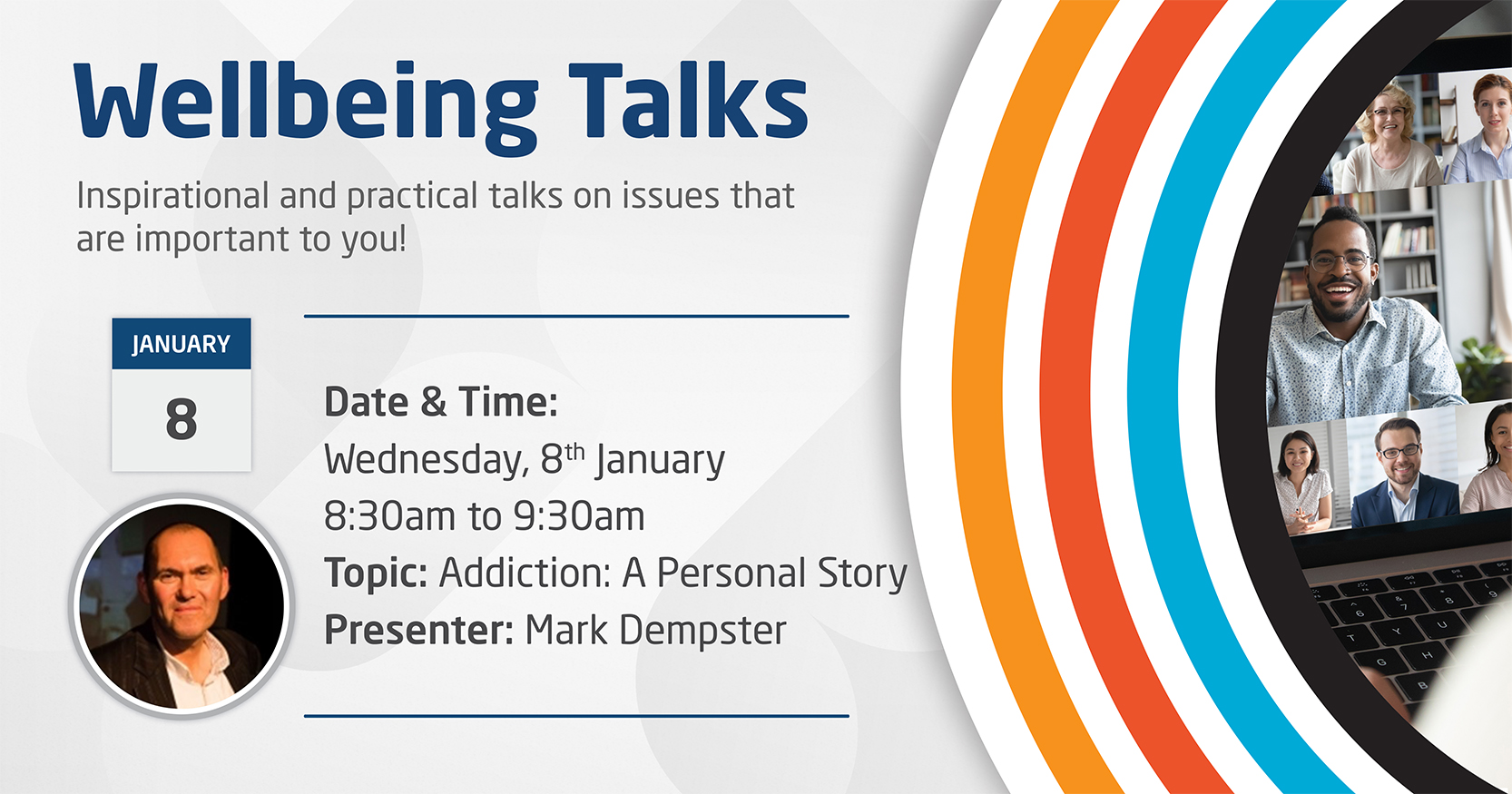January

Addiction: Breaking the Cycle
Addiction can be a silent struggle, impacting individuals, families, and workplaces alike. This article explores the signs, challenges, and pathways to recovery, offering tools and resources to support those affected. Together, we can foster understanding and help break the cycle of addiction.
This months health calendar articles are:
- Understanding Addiction: A Comprehensive Challenge
- Identifying Early Warning Signs of Addiction: Recognizing behavioral and physical indicators.
- Support Systems and Resources: Accessing help through counseling, support groups, and workplace programs.
- Preventing Relapse: Strategies for maintaining sobriety and creating a supportive work environment.

Understanding Addiction: A Comprehensive Challenge
Addiction is a complex, multifaceted condition that affects millions worldwide. Contrary to outdated beliefs that frame addiction solely as a personal failure or moral flaw, it is now recognised as a chronic disease impacting both the mind and body. It encompasses a range of dependencies—on substances like alcohol and drugs, or behaviours like gambling and internet usage—that can hijack an individual’s ability to make decisions and control impulses. At its core, addiction impacts brain functions, creating cravings and dependencies that persist despite negative consequences.
Addiction doesn’t discriminate; it can affect anyone, regardless of background, profession, or social status. People working in high-stress environments, such as the electrical and construction industries, may be more vulnerable due to intense physical demands, long hours, and often limited access to mental health resources. Recognising the roots of addiction as both biological and environmental is key to creating compassionate, effective support systems.
The Journey to Recovery: Practical Steps and Support
Overcoming addiction is often described as a journey because it requires time, patience, and the right support. Here are a few steps that individuals and communities can take to support recovery:
- Self-Awareness and Acknowledgment: The first step toward change is recognising the issue. For many, this is the hardest part. If you or someone you know is struggling, acknowledging the problem without judgment is crucial.
- Seeking Professional Help: Treatment often involves counselling, therapy, and sometimes medication. Cognitive Behavioural Therapy (CBT), group therapy, and specialised addiction support programs can all help individuals develop healthier coping mechanisms.
- Creating a Support Network: Addiction recovery thrives on strong support systems. Friends, family members, and supportive colleagues play a pivotal role in encouraging healthier choices. Having understanding people around makes it easier to manage triggers and build resilience.
- Setting Manageable Goals: Recovery is a gradual process. Setting small, achievable goals—such as focusing on a day at a time—can help individuals regain control without feeling overwhelmed.
- Addressing Underlying Causes: Addiction is often tied to other mental health issues, such as anxiety or depression. A holistic approach, which addresses these underlying conditions, offers a more comprehensive path to recovery.
How EIC Supports Those Facing Addiction
The Electrical Industries Charity (EIC) is committed to supporting individuals within the electrical industry who may be struggling with addiction. Recognising the unique challenges faced by those in high-pressure, high-stress roles, EIC provides access to counselling, mental health support, and peer networks designed to help individuals on their path to recovery. EIC’s confidential helpline offers free, non-judgemental and confidential guidance to those in need.
Ending the Stigma
Addiction is a condition that needs understanding, not stigma. The electrical industry is known for its resilience and dedication, and EIC encourages this same community strength to support and uplift those working to overcome addiction. A culture that fosters openness and empathy makes it possible for those facing addiction to seek help without fear of judgment, ultimately strengthening the entire industry.
Together, we can create an environment where addiction recovery is not only possible but encouraged. By acknowledging the realities of addiction, supporting one another, and leveraging resources like those offered by EIC, we can help individuals in our industry find healthier, more fulfilling lives.
Identifying Early Warning Signs of Addiction: Recognising Behavioural and Physical Indicators
Understanding Addiction in the Workplace
Addiction is often silent and may be hidden beneath a surface of daily routines and responsibilities. Early intervention is critical. Identifying warning signs early, employers, coworkers and friends can help connect individuals with necessary support resources before issues escalate. In the context of the electrical industry, where safety and focus are paramount, recognising these signs is not only a matter of individual health but also workplace safety.
Behavioural Warning Signs of Addiction
Behavioural indicators can reveal a shift in an individual’s relationship with substances or addictive behaviours:
- Changes in Productivity and Quality of Work: One of the earliest signs is often seen in productivity. Individuals may show a decline in the quality or consistency of their work, often missing deadlines, showing carelessness or failing to complete projects.
- Increased Absenteeism or Turning up late: Unexplained absences, being frequently late for work, or shift in working pattern of leaving work early can indicate potential issues.
- Shift in Personality and Relationships: People struggling with addiction may display increased irritability, defensiveness or a noticeable withdrawal from social interactions.
- Risk-Taking Behaviours: People experienceing addiction may engage in higher-risk behaviours, such as handling machinery or electrical equipment without caution, which can compromise workplace safety.
- Financial Concerns: Another sign could be financial struggles, such as borrowing money frequently or displaying anxiety about finances, which may hint at spending on addictive substances or behaviours.
Physical Indicators of Addiction
Physical signs can also be evident, although they may be subtler. These signs include:
- Visible Fatigue or Changes in Appearance: Persistent fatigue, bloodshot eyes or a general neglect of personal hygiene can be indicators.
- Changes in Weight: Rapid weight loss or gain may signal the presence of addiction, depending on the type of substance or addictive behaviour involved.
- Shakiness, Tremors or Sweating: Particularly in cases involving alcohol or certain drugs, physical withdrawal symptoms can manifest visibly.
- Unsteady Hands or Reduced Coordination: For those handling equipment, substances that impair motor skills can become evident in reduced coordination and focus.
Approaching a Coworker with Sensitivity
Identifying these signs is a first step, but supporting someone who may be struggling with addiction requires sensitivity and respect. If you notice concerning behaviours in a colleague, speak to them privately and express your concern non-judgmentally. Emphasise that your primary concern is their well-being and offer support by encouraging them to seek help through available workplace resources or support programs.
Support Systems and Resources: Accessing Help through Counselling, Support Groups and Workplace Programs
The Importance of Support in Overcoming Addiction
For individuals grappling with addiction, having access to a strong support system is often a crucial part of the recovery journey. Support from friends, family, coworkers and workplace programs can provide much-needed encouragement, accountability and resources. Addiction is complex and highly individual, so understanding the different types of support available can help each person find the resources that work best for them.
Accessing Counselling Services
- Employee Assistance Programs (EAPs): Many workplaces, including those in the electrical industry, offer Employee Assistance Programs designed to provide confidential counselling and resources for personal challenges, including addiction. These programs often cover short-term counselling sessions, assessment and referrals to addiction specialists
- Mental Health Counsellors and Therapists: Seeking help from a licensed therapist or addiction specialist can provide targeted strategies for managing addictive behaviours. Cognitive Behavioural Therapy (CBT), for instance, is commonly used to help individuals identify triggers and develop healthier coping mechanisms.
- Accessing Counselling through Health Plans: Many health insurance plans provide coverage for addiction-related therapy, making it accessible for employees. Counsellors can be found through employer-provided health networks or community mental health centres.
The Role of Support Groups in Addiction Recovery
- Peer Support Programs: Peer support is a fundamental aspect of many addiction recovery journeys. Programs such as: Alcoholics Anonymous, narcotics anonymous, gamblers anonymous, UK SMART recovery, Al-anon family groups are widely available, free and provide individuals with a space to connect with others who understand their struggles and offer mutual suppor
- Workplace Support Groups: Some companies have employee support groups that can be particularly valuable in high-stress industries. These groups provide safe spaces for open conversation and shared experiences. They also foster a non-judgmental environment where employees feel empowered to reach out for help.
- Virtual Support Groups: Virtual support groups are also increasingly available, making it easier for individuals to attend meetings or sessions regardless of location. Online meetings allow for flexible schedules and privacy, which can be especially beneficial for those who may feel hesitant about in-person support.
Workplace Programs for Ongoing Support
- Substance-Free Initiatives: Many organisations encourage a substance-free workplace environment through drug and alcohol awareness programs. These initiatives often include workshops or informational sessions to educate employees on addiction and related support options.
- Flexible Work Policies: Employers can support employees in recovery by offering flexible work schedules – allowing them to attend treatment sessions or support meetings as needed.
- Training for Managers and Supervisors: Training managers and supervisors to recognise the signs of addiction and approach employees with empathy can create a more supportive environment. Managers who are educated on addiction can serve as effective resources, guiding employees to the support they nee
Creating a Recovery-Friendly Work Environment
Supporting individuals in recovery is not only compassionate but also strengthens the workplace. Employers can play an active role in creating a recovery-friendly work environment by fostering a culture of respect, confidentiality and non-judgment. Additionally, maintaining open communication channels and clearly advertising available support options can empower employees to take proactive steps toward recovery without fear of stigma or discrimination.
Preventing Relapse: Strategies for Maintaining Sobriety and Creating a Supportive Environment
Understanding Relapse in Addiction Recovery
Recovery is a journey that involves many steps and ongoing effort. For many, maintaining sobriety over the long term can be a challenge. Relapse is often part of the recovery journey, yet with the right strategies and a supportive environment, individuals can better navigate these moments and continue their path toward lasting change. In the electrical industry, where high-stress situations and demanding schedules are common, it’s especially important for employers to create a work environment that supports employees in recovery.
Strategies for Preventing Relapse
- Identify Personal Triggers: Identifying personal triggers, such as certain people, places or stressors, is key to staying on track. People in recovery can work with counsellors or mentors to understand and plan for high-risk situations, ensuring they have tools to handle these triggers when they arise.
- Develop Healthy Coping Mechanisms: Many people in recovery find that building new, healthier habits helps replace addictive behaviours. Exercise, mindfulness practices and hobbies can be effective ways to manage stress, process emotions and focus on positive actions. Finding a coping activity that aligns with personal interests makes it more likely to be a sustainable habit.
- Set Realistic Goals: In recovery, progress is often gradual. Setting realistic, attainable goals—like maintaining a routine, focusing on self-care or attending weekly support groups—can help create a sense of achievement. Smaller goals that are met consistently often build confidence and reduce the urge to return to addictive behaviours.
Creating a Supportive Work Environment – Suggesting alcohol-free team activities where possible?
Encourage Open Communication: Open communication, especially when it comes to personal struggles, can make employees feel supported. Encouraging transparency within the company’s Employee Assistance Program (EAP) policies, for instance, helps employees feel confident seeking help without the fear of judgment or reprisal.
- Promote a Substance-Free Workplace: Creating a substance-free workplace goes beyond avoiding on-site substances. It includes awareness programs on addiction, training on safe substance use practices and establishing guidelines for handling substance use-related issues. This makes it clear that the company is committed to promoting a healthy environment for all employees.
- Offer Flexibility: Flexibility in the workplace can significantly impact recovery success. For example, flexible scheduling may allow employees to attend therapy sessions or support groups, which are crucial to maintaining sobriety. Workplaces that support flexible options for recovery-related needs build employee trust and loyalty.
Maintaining Peer and Professional Support
- Participate in Ongoing Counselling or Therapy: Ongoing counselling can provide continuous support and a place to talk through challenges in recovery. Professional support from therapists and counsellors can also offer relapse prevention techniques, helping individuals recognise the signs of potential relapse early.
- Lean on Peer Support Networks: Recovery communities, both within and outside the workplace, provide accountability, shared experiences and emotional support. In the workplace, recovery-friendly spaces can include peer-led groups or mentorship programs where employees can connect confidentially and find shared support.
- Take Advantage of Supportive Resources: Programs like Alcoholics Anonymous, narcotics anonymous, gamblers anonymous, UK SMART recovery, Al-anon family groups offer ongoing peer support and valuable insights from others in recovery. Workplace wellness programs or EAP services can provide similar benefits.
Encouraging a Relapse-Resilient Culture in the Workplace
Building a relapse-resilient workplace culture requires companies to treat addiction as a manageable condition, similar to any other health issue, rather than a moral failing. This shift in perspective allows employees to seek help and support without fear of stigmatisation or discrimination.
However, it’s crucial to recognise that not everyone feels comfortable disclosing their struggles at work. To ensure inclusivity, companies should provide confidential support channels and resources accessible to all employees, regardless of their disclosure status.
By educating coworkers and supervisors about addiction and recovery, workplaces can foster an environment that benefits everyone and strengthens overall employee well-being. Additionally, offering anonymous self-help tools or external support services can empower individuals to seek help on their terms, contributing to a more compassionate and accessible culture.
By promoting understanding, accessibility to support systems and a non-judgmental approach, workplaces can be a positive force in helping individuals maintain their sobriety and achieve long-term success.
